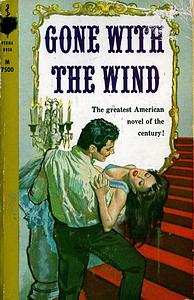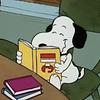You need to sign in or sign up before continuing.
Take a photo of a barcode or cover
This book makes other books look like mere mortals. I'm at a loss as to how one author can write so well and pack so very many events into one single book. I've read epics where less has happened in the course of a book or three. One of the things that fascinated me about this book was that Scarlett is absolutely not a likeable character but I found myself admiring her at times. The woman is made of steel. Granted, it's steel wrapped in selfishness and vanity, but it's steel nonetheless, and in times like these, it's people like Scarlett who survive. Another thing that I loved was that the story was mostly about women who were quite extraordinary yet it was written in 1939. All of the clamor for "strong female characters" these days and they're all RIGHT HERE! Maybe the current dearth of those very characters is because they were all used up in this book.
This book is one of the best books I've ever read and it instantly made my top 5 books of all time. It takes so much time to read the whole thing but I could have read another thousand pages and thrilled with every moment. Oh, and this is actually the first book ever to make me cry from a scene of intense tension. I loved this book.
This book is one of the best books I've ever read and it instantly made my top 5 books of all time. It takes so much time to read the whole thing but I could have read another thousand pages and thrilled with every moment. Oh, and this is actually the first book ever to make me cry from a scene of intense tension. I loved this book.
challenging
informative
reflective
medium-paced
Plot or Character Driven:
Character
Strong character development:
Complicated
Loveable characters:
Complicated
Diverse cast of characters:
Complicated
Flaws of characters a main focus:
Yes
I haven’t read a book I’ve hated this much in a long time.
I could talk about its blatant racism, but it seems that most of the other low reviews of this book deal with this in great detail. I’ll refrain from going that direction.
This book’s most egregious error lies in its attempts to manipulate its readers. As a genre, historical fiction has an obligation to its readers to tell the truth about its setting. This book, on the other hand, serves as an apology for the antebellum South. It mixes together a romanticized version of the Southern elite, a meticulous attention to detail regarding the Civil War (down to the weather on days specific battles took place), and ideals from the time it was written in the 1930s. It is important for Historical Fiction as a genre to be honest about how accurately it depicts its setting. Taking liberty with the setting is dangerous; it will cause the reader to either accept the book in its entirety without seeing its shortcomings, or it will make the reader mistrust the truth present in it. I
I also enjoy reading books containing archetypical characters, but when the majority of the characters act in extremes, it makes for very simplistic and unlikeable characters. Scarlett is one of the most depraved protagonists I’ve read about and yet I was supposed to like her as the book progressed. She was supposed to grow and demonstrate her strength while surviving the Civil War and Reconstruction. By the end of the book, she becomes much more proactive, but she also remains as selfish as she was at the beginning of the book. All the growth we see in her is superficial.
Margaret Mitchell, the daughter of a suffragette, was also in-tune with the conversations surrounding gender roles of her day. Her novel could have been a way for her to explore feminine ideals of the antebellum South, but instead she used her setting to preach a narrative that is not fitting to the time. Scarlett’s character was used to highlight important aspects of first wave feminism: her overt disdain for her children and the presentation of the horrors of birth, her obvious abuses of alcohol, and the continual conversation about how women were to “have no thoughts of their own” when they were painted by Mitchell to be the morally superior sex (though I would argue that Scarlett’s character does not do much to propagate this idea…).
Finally, as I mentioned towards the beginning of my review, this book serves as a justification for the antebellum South. While not every aspect of this culture is evil by any means, this book highlights some of the evils, especially in regards to slavery, and calls them good. This was especially clear to me in the book’s admiration of the Ku Klux Klan. While the Klan went off and murdered, they were highly esteemed in the novel for protecting the purity of the Southern women (since, according to the novel, as soon as slavery was abolished all of the freed slaves immediately set out on a thieving and raping extravaganza…). While, yes, this book is told from the perspective of the South and the South may have seen the beginnings of the Klan as good, the book accepted this wholeheartedly, not just the characters. The Klan is shown as a force for good even if their methods are a bit harsh; the reader is expected to praise the murderous deeds because it was necessary to protect white women.
While I think I’ve made most of my thoughts on this book clear, I will say that this book may deserve some attention due to how drastically it has shaped America’s view of the Civil War and specifically this romanticisation of its setting. It has become one of America’s most beloved novels, so it may be worth looking into in order to understand its impact on American culture.
I could talk about its blatant racism, but it seems that most of the other low reviews of this book deal with this in great detail. I’ll refrain from going that direction.
This book’s most egregious error lies in its attempts to manipulate its readers. As a genre, historical fiction has an obligation to its readers to tell the truth about its setting. This book, on the other hand, serves as an apology for the antebellum South. It mixes together a romanticized version of the Southern elite, a meticulous attention to detail regarding the Civil War (down to the weather on days specific battles took place), and ideals from the time it was written in the 1930s. It is important for Historical Fiction as a genre to be honest about how accurately it depicts its setting. Taking liberty with the setting is dangerous; it will cause the reader to either accept the book in its entirety without seeing its shortcomings, or it will make the reader mistrust the truth present in it. I
I also enjoy reading books containing archetypical characters, but when the majority of the characters act in extremes, it makes for very simplistic and unlikeable characters. Scarlett is one of the most depraved protagonists I’ve read about and yet I was supposed to like her as the book progressed. She was supposed to grow and demonstrate her strength while surviving the Civil War and Reconstruction. By the end of the book, she becomes much more proactive, but she also remains as selfish as she was at the beginning of the book. All the growth we see in her is superficial.
Margaret Mitchell, the daughter of a suffragette, was also in-tune with the conversations surrounding gender roles of her day. Her novel could have been a way for her to explore feminine ideals of the antebellum South, but instead she used her setting to preach a narrative that is not fitting to the time. Scarlett’s character was used to highlight important aspects of first wave feminism: her overt disdain for her children and the presentation of the horrors of birth, her obvious abuses of alcohol, and the continual conversation about how women were to “have no thoughts of their own” when they were painted by Mitchell to be the morally superior sex (though I would argue that Scarlett’s character does not do much to propagate this idea…).
Finally, as I mentioned towards the beginning of my review, this book serves as a justification for the antebellum South. While not every aspect of this culture is evil by any means, this book highlights some of the evils, especially in regards to slavery, and calls them good. This was especially clear to me in the book’s admiration of the Ku Klux Klan. While the Klan went off and murdered, they were highly esteemed in the novel for protecting the purity of the Southern women (since, according to the novel, as soon as slavery was abolished all of the freed slaves immediately set out on a thieving and raping extravaganza…). While, yes, this book is told from the perspective of the South and the South may have seen the beginnings of the Klan as good, the book accepted this wholeheartedly, not just the characters. The Klan is shown as a force for good even if their methods are a bit harsh; the reader is expected to praise the murderous deeds because it was necessary to protect white women.
While I think I’ve made most of my thoughts on this book clear, I will say that this book may deserve some attention due to how drastically it has shaped America’s view of the Civil War and specifically this romanticisation of its setting. It has become one of America’s most beloved novels, so it may be worth looking into in order to understand its impact on American culture.
" Was Tara still standing? Or was Tara also gone with
the wind which had swept through Georgia? "
Margaret Mitchell's epic classic of life in the South is (and for good reason) one of the most popular books ever written.
Exploring the life of well to do Georgians during the American Civil war, and carrying through to the "Reconstitution Era" Gone with the Wind is a controversial retelling of what life was like for the staunch Southerners well-meaning or not.
With an arguably unlikable protagonist Mitchell forces you to look past your initial opinion of Scarlett O'Hara, eventually seeing her character develop into a deeper (while still quite shallow) person.
Expertly written this classic is a daunting must-read.
This is just an amazing book. The history isn't always accurate, but the feel of the time period and imperfection of the passionate, selfish, misguided love story just reel you in. This is one of those books I can pull off the shelf every once in a while and read it from cover to cover in a few days, just to remember it all over again.
emotional
medium-paced
Plot or Character Driven:
A mix
Strong character development:
Yes
Loveable characters:
Yes
Flaws of characters a main focus:
Complicated
medium-paced
I loved the movie, so I'm sooo happy to read the book. It's better than the movie, no doubt about it.
funny
informative
lighthearted
medium-paced
Plot or Character Driven:
Character
Strong character development:
Yes
Loveable characters:
Yes
Diverse cast of characters:
Yes
Flaws of characters a main focus:
Yes





